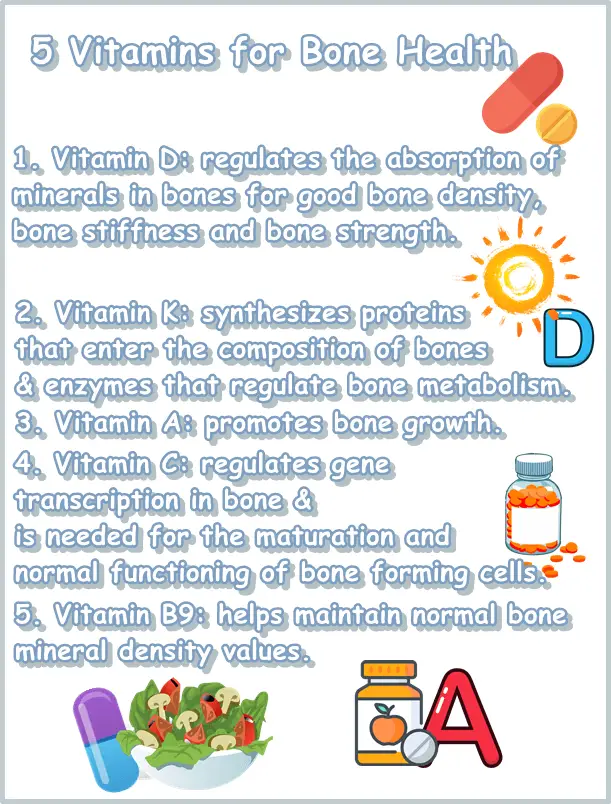Nutrition plays a crucial part in maintaining good bone density and can make the difference between strong, healthy bones, and poor bone density and increased risks of bone fractures. Of the dozens of essential nutrients that are needed in the diet every day, 5 vitamins hold benefits specifically for bones.
Making sure you get these 5 vitamins in your diet every single day in sufficient amounts can help keep your bones strong and healthy.
From regulating the absorption of minerals into bones for improved bone density and bone strength to developing of new bone tissue, these 5 vitamins are essential for bone health.

1) Vitamin D
Nowadays kids are getting vitamin D supplements since infancy as per official recommendations, and it shows: no more rickets, a statistically taller and beautifully formed bone frame, and greater bone strength. Biologically, vitamin D acts as a hormone or hormone-like agent and one of its main functions is to regulate blood calcium and phosphorus levels and the absorption of calcium and phosphorus into bones and teeth (study).
In other words, it’s vitamin D that makes the decision on how well bone-building minerals such as calcium and phosphorus are absorbed, playing a central role in normal bone development and bone metabolism. Building on existing scientific data on the functions of vitamin D in bone metabolism, studies have also identified vitamin D as a key component in limiting periodontal disease advancement.
2) Vitamin K
Vitamin K is not the first essential nutrient we’d associated with having strong bones. Yet dietary supplements aimed specifically at maintaining good bone density and reducing osteoporosis risks and advancement often contain vitamin K in addition to the classics (calcium, magnesium, vitamin D).
According to research, ‘vitamin K is involved in the synthesis of several proteins in bone’ as well as the synthesis of essential enzymes that are directly involved in bone metabolism and maintaining a healthy bone mineral density. The form of vitamin K known colloquially as vitamin K2 is particularly good for bone health, helping preserve bone strength (study). Unrelated population-based studies have also observed that individuals receiving anticoagulant therapy also had higher risks of bone fractures.

3) Vitamin A
Although known largely for its role in skin care and anti-aging benefits, vitamin A is a much more versatile essential nutrient. At the basis of its anti-aging action stands its central role in cell growth and cell differentiation. That is, vitamin A helps grow new cells for cell renewal, hence the anti-aging action, and determines what the new cells become, essentially their role and functions in the body. This function is a source of important benefits for the maintenance of connective tissue in general, one type of connective tissue being bone tissue.
Moreover, ‘several epidemiological studies reported that a higher of serum vitamin A level could improve bone health’. Vitamin A contributes to better bone mineral density and bone health ‘by restraining the excessive secretion of parathyroid hormone, a higher level of which was suggested to result in poor bone health’ and by actively promoting bone growth ‘by means of affecting the growth hormone and stimulating the production of insulin-like growth factor 1, which are conducive to bone health’ (study).
4) Vitamin C
Vitamin C is well known for its anti-inflammatory properties, antioxidant and anti-aging action and immuno-stimulating benefits. But how is it good for bones? Vitamin C actively stimulates the production of collagen which is the main structural protein in the body. But collagen isn’t just for skin elasticity. There are in fact different types of collagen that essentially provide structure to different kinds of tissue throughout the body.
Studies have found that vitamin C stimulates the production of collagen types 1 and 3, resulting in functional benefits related to the development and maintenance of bone tissue. Moreover, according to research, vitamin C is directly involved in ‘regulating gene transcription in bone’ related to the the maturation and normal function of osteoblasts (study).
Osteoblasts are cells from which new bone grows. A deficiency of vitamin C, which is common and easily attainable, can negatively impact new bone formation at cell level and increase risks of osteoporosis and associated bone fractures.
5) Vitamin B9 (folate)
Folate is the natural form of vitamin B9, occurring in unprocessed foods. It acts as an enzymatic cofactor in a wide range of metabolic reactions, many of which impact bone formation and subsequently also bone mineral density and risks of bone fractures. Studies have correlated high blood levels of vitamin B9 with better bone density.
‘Large population-based studies have demonstrated that low (…) folate levels are associated with increased fracture risk and/or decreased bone mineral density values (study). Moreover, folate is a ‘cofactor for the enzyme of nitric oxide synthase, which can promote the maintenance of bone density by helping to preserve optimal nitric oxide synthase activity in the bone cells’ (study).
While all B complex vitamins are required in the diet every day for normal cell growth and cell metabolism, vitamin B9 is directly involved in cellular division which explains why it plays a central role in maintaining bone density and advancing bone health.
